This article was medically reviewed by Erik Kramer, DO, MPH and by wikiHow staff writer, Hunter Rising. Dr. Erik Kramer is a Board-Certified Primary Care Physician at the University of Colorado. With over 15 years of experience, his clinical interests include obesity and weight management, diabetes care, and preventive care, as well as embracing a holistic approach to primary care. He received his Doctorate in Osteopathic Medicine (D.O.) from the Touro University Nevada College of Osteopathic Medicine and completed his residency at Central Maine Medical Center. Dr. Kramer is a Diplomate of the American Board of Obesity Medicine.
There are 8 references cited in this article, which can be found at the bottom of the page.
This article has been viewed 12,702 times.
Everyone gets minor illnesses or injuries that tend to heal on their own, but it can be hard to determine when your symptoms get bad enough to have them checked by a doctor. While you shouldn’t assume the worst right away, monitor what symptoms you’re experiencing and how long they’ve lasted to determine their severity. If you ever are questioning whether to make an appointment for your conditions, call and talk to your primary care provider to talk about your symptoms. To ensure that you stay healthy, be sure to get yearly check-ups and go to follow-up exams.
Steps
Recognizing Serious Symptoms
-
1Go to the emergency room for severe, localized pain or large open wounds. If you have debilitating pain or the pain limits how you function, contact emergency services as soon as possible and explain your condition to the person on the other line. Emergency services will send an ambulance if you need immediate care, or you can have someone you know take you to the emergency room if you don’t need an ambulance. When you get to the emergency room, explain your symptoms again so you can get medical attention.[1]
- You should also visit the emergency room if you have difficulty breathing, sudden numbness or weakness, severe headaches and head injuries, and sudden inability to speak, see, or move.
- Pay close attention to stinging pain in your chest since it could indicate something serious, such as a heart attack. Try to stay calm since it could also be a symptom of many other things.
-
2Check if you’ve had a fever for over 3 days or if it’s above 103 °F (39 °C). Fevers are usually signs that your body is already fighting an illness, such as the flu or bacterial infection. If you aren’t feeling well, take your temperature with a thermometer and check the reading. If you have a fever that’s already over 103 °F (39 °C), go to the doctor’s as soon as possible to determine the cause. If you have a fever between 100–102 °F (38–39 °C), monitor your temperature for another 2 days, and visit your doctor if it persists.[2]
- Contact your doctor if you also have a rash along with your fever.
- If you have a severe headache paired with a fever, visit the emergency room since it could potentially indicate a more serious condition.
- Pay close attention to fevers if you’re unable to keep down liquids or stay hydrated because it signifies something more severe.
Advertisement -
3Look out for signs of a concussion if you’ve had a head injury. Bumping your head on something lightly isn’t likely a cause for concern, but more severe injuries need professional care to ensure you don’t have any brain damage. If you feel dizzy or sluggish, experience nausea, or have a sensitivity to light and noise, you may have a concussion and need to see a doctor. You should also seek medical help if you have mood swings, confusion, or trouble sleeping after your injury.[3]
- Don’t leave a concussion untreated since it could have lasting problems on your brain.
- If you’re involved in sports, you will have to go through concussion protocol and get cleared by a medical provider before participating again.
-
4Pay attention to changes in your digestive health and urinary habits. Your digestive health includes the upper tract, which includes your esophagus and stomach, as well as your intestines. While an occasional upset stomach isn’t a problem, if you frequently feel heartburn or nausea, have difficulty swallowing, or experience hoarseness that doesn’t go away, contact your doctor. Call their office if you also experience black or tar-colored stools, diarrhea for more than 3 days, or unexplained urges to use the bathroom.[4]
- Visit an emergency room if you have blood in your vomit, stool, or urine since they can be signs of an infection or more serious illnesses.
- Pay attention to symptoms after traveling to foreign countries since you may be transmitting an illness.
- If you already feel full but you haven’t eaten much food, there may be an underlying condition causing it.
-
5Talk to your doctor if you’ve had unexplained weight loss. While losing weight is fine while you’re exercising and dieting, it can be a sign of something more serious if you don’t know the reason. Stand on a scale to check your weight every 6 months and write the measurements down to compare them. If you notice you lost weight between your measurements, then talk to your doctor.[5]
- For example, if you weigh 150 pounds (68 kg), multiply it by 0.05 (5%), which will give you 7 1⁄2 pounds (3.4 kg). Subtract the answer you found from your original weight, which gives you 142 1⁄2 pounds (64.6 kg). That means if you weigh 142 1⁄2 pounds (64.6 kg) in 6 months, you’ve lost 5% of your original body weight.
- If you normally get full after eating very little, talk to your doctor about running additional screenings.
- Unexplained weight loss can signify many things, so don’t try to worry. However, it could signify something more serious, such as overactive thyroid, diabetes, depression, liver disease, or cancer.
-
6Contact a gynecologist if you have irregularities in your menstrual cycle. Your period should occur regularly each month unless you’re on a form of birth control. Pay attention to when you normally experience your menstrual cycle so you know when to expect it each month. If you have irregular bleeding, severe cramps, or periods that are heavier than usual, call your primary care provider or gynecologist to schedule an appointment. You should also take notice if your periods stop for 3 months or longer or if they don’t come when you expect them.[6]
- Problems with your menstrual cycle could potentially be symptoms of diseases such as thyroid dysfunction, diabetes, cancer, and mental health problems. However, you may also have irregularities due to stress, so don’t assume the worst.
Tip: See a gynecologist once per year for a pelvic exam and Pap smear if you’re between 21–29. Once you’re older than 29, you should still get a pelvic exam yearly, but you can usually switch to a Pap smear every 2 years.
-
7Schedule an appointment for any symptoms that don’t improve in 1–2 weeks. Usually, your body can heal itself from minor ailments, so try to rest as much as you can while you recover. If you’ve had symptoms before that are similar to the ones you’re experiencing now, think about how long they lasted before you felt better. If your condition hasn’t improved in that amount of time, you may have a more serious illness and should contact your doctor.[7]
- For example, if you normally have a sore throat for 2 days when you have a cold, then you should see a doctor if you’re experiencing one for a full 1–2 weeks since it may be something more severe.
- If you have sudden symptoms, such as extreme localized pain or numbness, call emergency services instead.
Scheduling Regular Appointments
-
1Visit your primary care provider at least once yearly for a regular physical. Call your doctor’s office and let them know that you’d like to schedule a wellness check and physical. When you go in to see your doctor, they will check all of your vital signs and ask you questions about how you’re feeling or if you have any concerns. Be completely honest with your doctor so they can provide the best care and find the cause for any symptoms you’re feeling.[8]
- If you have chronic conditions, your doctor may ask you to come in more often than once per year.
- Depending on what concerns you have, your doctor may need to run additional tests.
- It can sometimes be difficult to tell doctors the full truth if you don’t want to pay for treatment or if you don’t know what you have can be a problem. Just know the doctor is there to help you in the best and most cost-effective way so you can stay healthy.[9]
-
2Let your doctor know if you’ve had a change in symptoms since your last visit. If you have a condition or something you’re concerned about, such as the size of a mole or a chronic pain, mention it to your doctor. Try to give as many details as you can and point out the area that you’re concerned about. Your doctor will examine it closely, run additional tests, or recommend you to a specialist to help you get the care you need.[10]
- For example, rather than saying you have “foot pain,” you may instead say, “stinging pain in my heel whenever I walk.”
Warning: Don’t ignore chronic or worsening symptoms since they may be signs of severe problems.
-
3Make additional appointments whenever your doctor recommends follow-ups. Ask your doctor when you should see them again, especially if you have chronic conditions or are given medical treatment. Be sure to schedule an appointment for the time as soon as you’re able so you can plan accordingly and ensure that you’re able to see your doctor. Attend all of the follow-up appointments to make sure that you’ve recovered completely.[11]
- Don’t skip follow-up appointments since you may not know if your condition has worsened or improved.
-
4Schedule screenings for common diseases on a regular basis. Talk to your doctor about your need for screening cancer, blood pressure, and diabetes to see if you need to get checked. If you do, allow your doctor to run tests or exams to ensure you’re healthy. Schedule follow-up appointments whenever your doctor recommends, which is usually once or twice per year. Make sure to continue screening any concerns since your condition may change over time.
- Mention to your doctor if you have any family history with diseases since they may start screening you when you’re younger.
-
5Call your doctor if you have new symptoms after being treated or starting medicine. Be sure to follow any prescriptions or care advice that your doctor recommends to help you fight off any diseases. If you start feeling worse or have adverse reactions to your treatment plan, reach out and explain your symptoms to them. Your doctor may have you come in for additional tests or they may have you switch prescriptions.[12]
- Make sure your doctor knows about any allergies you have so they don’t prescribe something that gives you a negative reaction.
-
6Contact your doctor if your family’s medical history changes. It can be difficult when a family member gets sick, but it’s also important to pay attention to genetic illnesses since they could pass down to you. If they develop any new chronic illnesses or they have medical concerns, reach out to your doctor and let them know. Your doctor may not do anything immediately, but they could start screening for diseases at an earlier time to catch it before your condition may worsen.[13]
Warnings
- When in doubt, call your doctor and explain your symptoms to them. They can tell you over the phone if they think you need to schedule an appointment or not.⧼thumbs_response⧽
- Don’t ignore chronic symptoms you’re experiencing since they could be precursors to more serious problems.⧼thumbs_response⧽
References
- ↑ https://www.beaumont.org/health-wellness/blogs/should-you-go-to-the-er-dont-downplay-potentially-serious-symptoms
- ↑ https://familydoctor.org/deciding-see-doctor/
- ↑ https://familydoctor.org/deciding-see-doctor/
- ↑ https://www.mayoclinic.org/healthy-lifestyle/adult-health/in-depth/symptoms-not-to-ignore/art-20045276
- ↑ https://www.mayoclinic.org/healthy-lifestyle/adult-health/in-depth/symptoms-not-to-ignore/art-20045276
- ↑ https://familydoctor.org/deciding-see-doctor/
- ↑ https://www.takingcharge.csh.umn.edu/enhance-your-wellbeing/security/prevention/when-should-you-go-doctor
- ↑ https://www.self.com/story/how-often-to-see-different-doctors
- ↑ https://health.usnews.com/health-care/patient-advice/articles/2019-01-07/why-do-patients-lie-to-their-doctors
- ↑ https://health.usnews.com/health-news/patient-advice/articles/how-often-should-you-see-the-doctor
- ↑ https://health.usnews.com/health-news/patient-advice/articles/how-often-should-you-see-the-doctor
- ↑ https://familydoctor.org/deciding-see-doctor/
- ↑ https://health.usnews.com/health-news/patient-advice/articles/how-often-should-you-see-the-doctor
- ↑ http://www.cfah.org/prepared-patient/find-good-health-care/deciding-when-to-seek-care



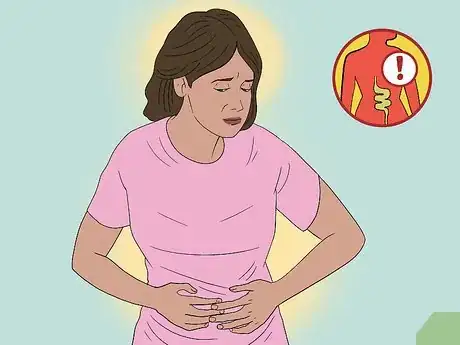

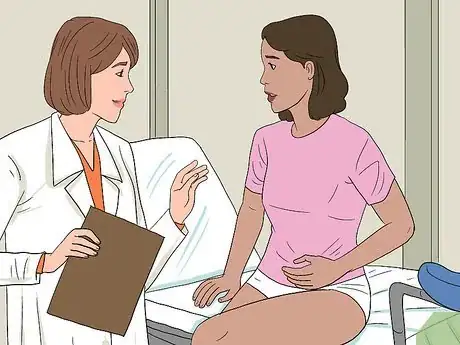

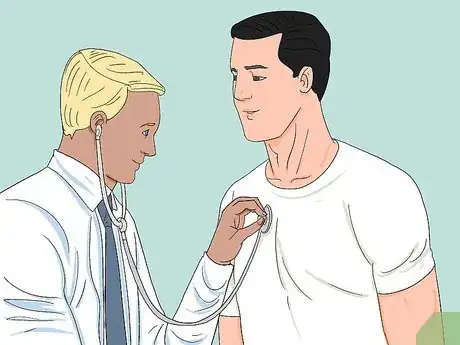
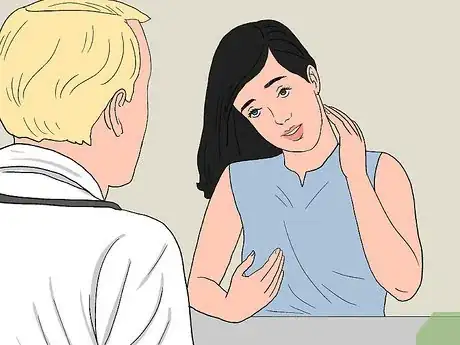
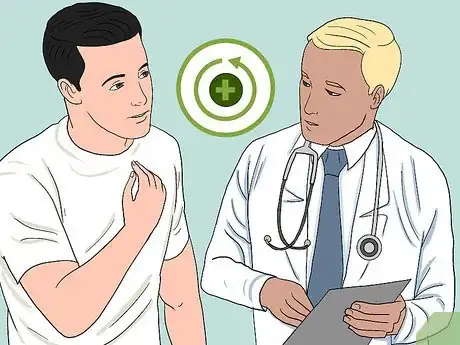





























































Medical Disclaimer
The content of this article is not intended to be a substitute for professional medical advice, examination, diagnosis, or treatment. You should always contact your doctor or other qualified healthcare professional before starting, changing, or stopping any kind of health treatment.
Read More...